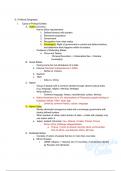9.1 Political Geography
I. Types of Political Entities
A. States (Country)
- Has to follow requirements:
1. Defined territory with borders
2. Permanent population
3. Government
4. Recognition from other states
5. Sovereignty: Right of government to control and defend territory
and determine what happens within its borders
- Problems of Defending States
a. China and Taiwan
- Chinese Revolution -> Nationalists flee -> Declare
sovereignty
B. Quasi-States
- Having some but not all features of a state
a. Kosovo (Declared independence in 2008)
- Serbia vs. Kosovo
b. Kashmir
c. Tibet
- India vs. China
C. Nation
- Group of people with a common identity through shared cultural traits
(e.g. language, religion, ethnicity, heritage)
- What defines it:
- Common language, history, race/ethnicity, culture, territory
a. Native Hawaiians lie in US: descendents of Polynesian people landing on
Hawaiian islands 1000+ years ago
i. United by common history, culture, language
D. Nation State
- Mostly ethnically homogenous state with a sovereign government with
clearly defined borders
- When borders of nation match border of state - a state with (ideally) only
one nation within it
a. Japan, Iceland, Denmark, Iran, Albania, Croatia, Poland, France
- Some critics challenge categorizations
a. France = home to diverse minority ethnic communities
from N Africa, sub-Saharan Africa, SE Asia
E. Multistate Nation
- Consists of nation of people that live in more than one state
a. Ethnic Russian
i. USSR collapse -> dissolve into 15 countries -> Ukrainians identify
as Russian and Ukrainian
, ➢ Irredentism: Attempting to acquire territories in neighboring states
inhabited by people of same nation
a. Russia accused by irredentism when attempted to expand territory
in Ukraine with significant Russian population
F. Multinational Nation
- Country with various ethnicities and cultures within borders
- Sometimes struggle to create sense of unity among different people's
- Sometimes able to forge national identity despite presence of different
ethnicities, cultures, religions
a. US, Russia, former Yugoslavia, Iraq, Canada
G. Stateless Nation
- Large group of people from particular ethnic group in territory that is
without sovereign state of its own
1. Minority ethnic group in multiple states
2. Often leading to persecution and resentment
a. Tribal nations in US
b. Katalonians
c. Kurds
d. Basque people in Spain
e. Establishment of Israel 1948
- Palestine (former British colony) established as state of Israel after
Holocaust
- Conflict with Palestinians and its Arab neighbors over ownership
of land considered holy by many Jews, Christians, Muslims
H. Autonomous and Semi Autonomous Regions
- Some countries contain autonomous and semi autonomous regions
➢ Autonomous/Semi Autonomous: Given some authority to govern own
territories independently from national government
a. Hong Kong is autonomous
i. Different currency system from China
b. American Indian reservations are semiautonomous
i. Gambling casinos permitted on Indian reservations when illegal
where it is located
9.2 Political Power and Geography
I. Issues of Space and Power
1. Territoriality: control and influence over specific geographic space
- “Attempt by an individual or group to affect, influence, or control people,
phenomena, and relationships by delimiting and asserting control over a
geographic area”
- Governments form around these space, build political power, establish
sovereignty
- Control territory + protect from outside interference





